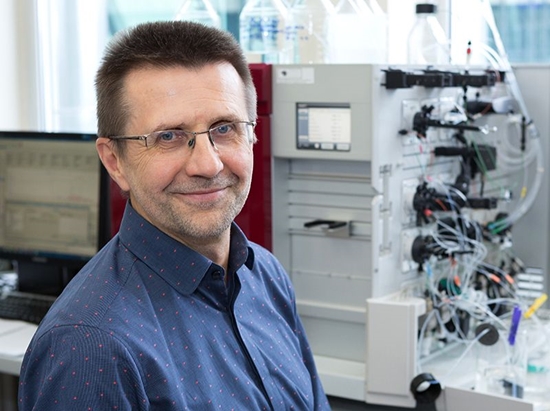Million-dollar Kavli prize recognizes scientist scooped on CRISPR
Award? goes to biochemists Virginijus Siksnys, whose lab independently developed the gene-editing tool, Emmanuelle Charpentier and Jennifer Doudna.

CRISPR has hauled in yet another big science award, and this time the recognition includes a scientist whose contribution has sometimes been overlooked.
Two biochemists widely credited with co-inventing the gene-editing technology, Emmanuelle Charpentier and Jennifer Doudna, were named on 31 May as the winners of this year’s Kavli Prize in Nanoscience. So was Virginijus Siksnys, a Lithuanian biochemist whose independent work on CRISPR has thus far garnered much less mainstream attention — and Nobel-prize buzz — compared with that of Charpentier, Doudna and some other scientists.
Researchers working on the mechanism of hearing and on the formation of stars and planets also won Kavli prizes this year, in neuroscience and astrophysics, respectively.
The Kavli Foundation, established by the late Norwegian philanthropist Fred Kavli in Los Angeles, California, and the Norwegian Academy of Science and Letters in Oslo announced the three biennial prizes, each of which comes with US$1 million to be split among the winners. First awarded in 2008, the prizes honour seminal research selected by three panels of experts from six global science societies and academies.
Big awards for tiny marvels
The nanoscience committee awarded the prize to Charpentier at the Max Plank Institute for Infection Biology in Berlin, Doudna at the University of California, Berkeley (UC-Berkeley), and Siksnys at Vilnius University in Lithuania “for the invention of CRISPR-Cas9, a precise nanotool for editing DNA, causing a revolution in biology, agriculture and medicine”.
In 2012, a group led by Charpentier and Doudna1, and several months later one led by Siksnys2, reported programming the CRISPR–Cas9 system to cut DNA at specific sites. Since then, award committees, the media and some in the scientific community have emphasized the roles of Doudna and Charpentier in developing the transformative gene-editing tool. In 2015, the pair shared the Breakthrough Prize in Life Sciences, worth $3 million, for example. But Siksnys’s work on CRISPR has occasionally been overlooked. The Kavli nanoscience committee recognized that the three researchers conducted “key pioneering work” in the development of CRISPR-based genome editing, says chairman Arne Brataas, a physicist at the Norwegian University of Science and Technology in Trondheim.
Siksnys says he was “surprised” when a phone call from Oslo announced that he would share the Kavli prize with Doudna and Charpentier. “You don’t expect such calls every day,” he says. The Lithuanian researcher says he is still disappointed that it took so long to publish his results. Cell rejected his paper in April 2012 without sending it out for peer review; Doudna and Charpentier submitted their work two months later to Science, which fast-tracked it for publication. The Kavli prize is “a good example that you can achieve your goals and get recognition”, Siksnys adds.
“This is a well-deserved prize for three individuals whose discovery made an enormous impact on modern biology,” says Rotem Sorek, a microbial geneticist at The Weizmann Institute of Science in Rehovot, Israel. Sorek is not surprised the prize was awarded to Siksnys. “In the field of CRISPR he is well-known as one of the pioneers of the technology.”
“It's nice that the recognition is being spread around,” adds Dana Carroll, a biochemist at the University of Utah in Salt Lake City. But he notes that many others have contributed to the development of CRISPR. “Big breakthroughs come as a result of many contributions over many years,” so it's hard to pin down who should receive recognition, Carroll says.
Synthetic biologist Feng Zhang, at the Broad Institute of MIT and Harvard in Cambridge, Massachusetts, has also shared in the accolades. His team was among the first to apply CRISPR gene-editing to mammalian cells, including mouse and human cells3. Zhang’s employer is embroiled in a high-stakes patent dispute with UC-Berkeley, where Doudna works, over the technology.
“There's the tendency to pick the principal investigators,” says George Church, a geneticist at Harvard Medical School in Boston, Massachusetts, whose team also deployed CRISPR on human cells4. Young researchers such as the students and postdocs who turned CRISPR into a powerful gene-editing tool tend to be ignored, he adds. But Church also argues that more attention should be paid to other DNA-editing methods, including zinc-finger nucleases and TALEN nucleases, which were developed before CRISPR and are already finding use in medicine and agriculture.
?Celestial life cycles
The neuroscience award went to geneticist Christine Petit of the Pasteur Institute in Paris, and neuroscientists Robert Fettiplace at the University of Wisconsin–Madison and James Hudspeth at the Rockefeller University in New York City, “for their pioneering work on the molecular and neural mechanisms of hearing”. The researchers independently investigated the role of hair cells in the inner ear. These cells, which are covered in microscopic hair-like projections, detect sound signals and transmit them to the brain5.
Ewine van Dishoeck, winner of the astrophysics category, works in astrochemistry at Leiden University in the Netherlands, where she has made her mark “elucidating the life cycle of interstellar clouds and the formation of stars and planets”, according to the prize citation.
Her work combines theoretical studies with observations — especially, infrared spectroscopy — and laboratory experiments to understand how compounds form in space, including the organic molecules that might have been the building blocks for life. She has also used radio telescopes to study planet formation around other stars. Van Dishoeck is the president-elect of the International Astronomical Union (IAU), and will lead celebrations next year as the IAU celebrates its 100th anniversary.
The laureates will receive their prizes in Oslo on 4 September.
Reference: Nature


ارسال به دوستان